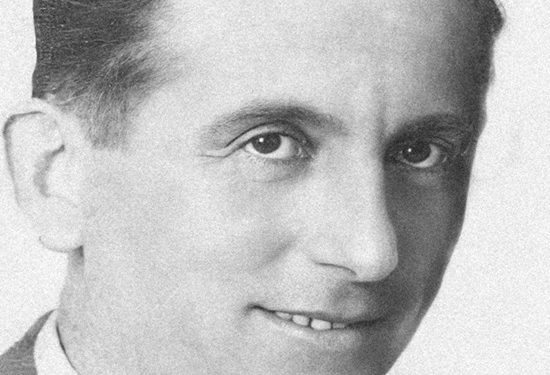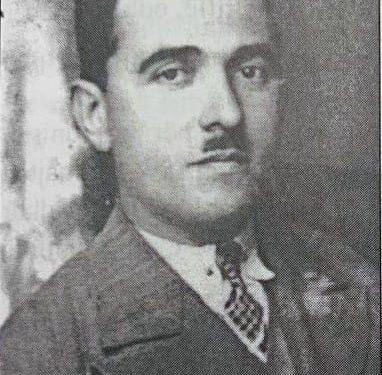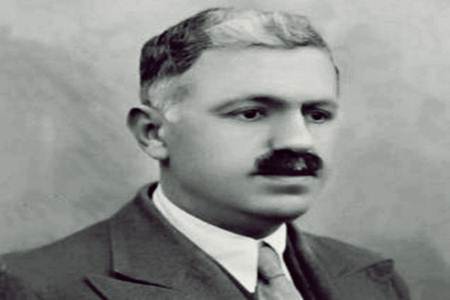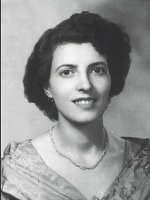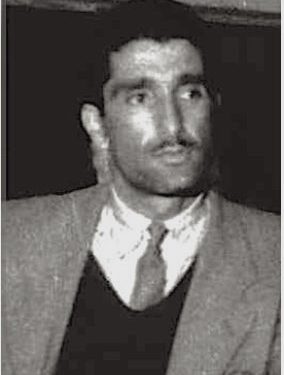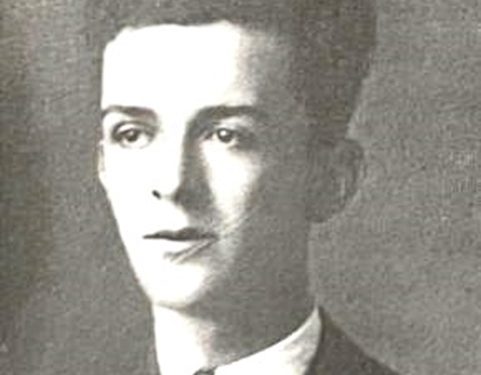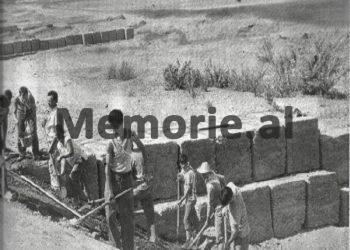By Ahmet Bushati
Part Eighteen
Memorie.al/After the flag was altered in 1944 with the addition of the communist star, Shkodra transformed into a center of resistance against the regime, paying a high price for its tradition of freedom. By April 1945, high school students, already feeling betrayed by the promises of the war, gathered to oppose the new terror that imprisoned and killed innocent people. Communism turned Kosovo into a province of Yugoslavia, while Shkodra was punished for its “historical crime”- its defiance against invaders. The “Postriba Movement” became a tool to suppress all dissent, plunging the city into an unprecedented spiral of suffering: imprisonments, executions, and the destruction of families. The high school students, alongside citizens, became symbols of resistance, while some “young communists” turned into tools of the State Security, leading to expulsions, imprisonments, and internments.
Four times, Shkodra rose in armed rebellion, but history forgot these battles. This book is written to remember the countless prisoners, the tortured, the killed, and the parents who suffered in silence. It is a warning against dictatorship and a plea for future generations not to forget the sacrifices made for freedom.
Continued from the previous issue
In the Footsteps of a Diary
Shkodra in the first years under communism
Three brothers from the Golemi family were arrested within a short time: Nexhipi, Asimi and Sirriu. Nexhipi, who had once been an officer, would serve very little prison time, but would die suddenly and in mysterious circumstances, leading his people and others to believe that his death had been the work of the Sigurimi. After Nexhipi, Sirriu was arrested, who had interrupted his university studies in Italy during the war and, upon returning to Albania, had joined the nationalist organization ‘Balli Kombëtar’. As such, in the summer of 1944, as a member of the “Besnik Çano” battalion, he would take part in the fighting for the defense of the Albanian lands of Kosovo.
Shortly after Sirriu, Asimi, who had initially been a teacher and later a prefecture secretary, was also arrested. As a footballer for the “Vllaznia” team, he had made many of its victories linked to his name. Around this time, Musa Gjylbegu, former Minister of the Botorjes during the short Regency period, had surrendered – as if after the amnesty -, something for which he would be sentenced and after many years in prison, die in that of Burrel.
It was that dark time, when only in one of the Gjylbegu’s houses, the three daughters-in-law that she had, sisters-in-law among them, were dressed in black, because each of them had a brother killed by the communist government: thus Riza Gjylbegu’s wife, Xhevria, wore black in mourning for her brother, Qazim Bushati; Osman Gjylbegu’s, Sania, for her brother, Xhemal Mliken; while that of the third and last brother, Musa, Zynia, for his brother, Riza Resulin.
In connection with the events of Postrriba, Qamili was arrested from Gjylbegaj together with his brother, Gjyl, who like Gjylbegaj, were undoubtedly the richest. Hamid Gjylbegu, who had graduated with distinction from the military academy in Istanbul, who had been an activist in the independence movement and who had successfully led the volunteer forces against the Montenegrin armies in the Koplik war, was also arrested.
Hamid Gjylbegu would be the only person in Shkodra, – and perhaps even in Albania – who, as long as there was a communist regime in Albania, in mourning, would never have turned on an electric light in his house, having even returned to the lamp and the wick, as in the time of Turkey, and what was even more important, again perhaps as the only person who would never agree to vote during the communist regime, despite the numerous pressures that would be put on him from time to time, by the people in power.
Virtuti, his only son, a student in Elbasan, would also be arrested at that time and after a year, when he was in the terrible camp of Vloçisht, out of despair, he sought death, for which he spent one night, wrapped in a white mattress sheet, attacking the barbed wire, with the intention of killing the guards, as he did on that occasion. The prisoners from Elbasan would speak the best words about him, for his behavior as a very good and characterful boy, without failing to mention his handsome appearance with pain. Without a doubt, that Virtuti was the open and permanent wound in the heart of his father Hamid Gjylbegu.
Not even Lec Harapi, son of the martyr Zef Harapi, killed in an attempt to join the rebel forces of Haxhi Qamili, who himself had served for many years as a translator at the Italian consulate in Shkodra, would escape the sword of the dictatorship. Simoni, his nephew, a former prominent employee in the forestry sector, would escape the sword of the dictatorship. From the Kujxhia family, on the occasion of the Postrriba uprising, her eldest son Zefi would be arrested, and after him Vitori, when he was a high school student, who would be released from prison after three years, to be imprisoned again after a few more years, together with his younger brother, Injaci, who would serve eighteen and ten years in prison, respectively.
The well-known Kurti family would have three sons go to prison: Salvatori, who had run the “Adriatik” coffee shop, which was in competition with the “Kafe e Madhe”, Nino, who had graduated from the gendarmerie academy in Italy, and who, as implicated in the “Albanian Unity” organization, would be sentenced to thirty years in prison, and Kolën, who in Padua, Italy, for war reasons, had interrupted his pharmacy studies and, during the Postrriba uprising, was arrested and served ten years in prison, followed by four others in exile.
Nino and Kola had for their father Zef Kurti, the famous musician and conductor of the city band for years and years, as well as the professor who had taught us Italian in high school; for their uncle, Lec Kurti, former chairman of the “Ball” for Shkodra, and Salvator who managed the “Adiatik” cafe, and for their grandfather, the former author of the famous “jare” of Shkodra, Palok Kurti. Also in prison at that time was Hysen Lohja, one of the first teachers to graduate from the “Normale” school of Elbasan, whom the Italians had interned as a patriot and legalist. After his internment, he would go out into the mountains with a rifle in his hand, to fight the invaders. He would be convicted and serve five years in prison.
During the Postrriba Uprising, his brother Selimi would also be arrested, who would serve a short prison sentence, while Ragip, the third of the brothers, a former trusted official in the Ministry of Internal Affairs during the Kingdom, and who as an athlete had once represented Albania in Paris, in the 100 m race, would serve ten years in prison, and then escape to France, where he would one day close his eyes.
When Hyseni was turning eighty years old, he would be exiled the day after the wedding of one of his sons, with the most banal and unbelievable pretext, because during that wedding night, Slavic songs had been sung. Another large family that would pay for communism with almost all of its men would be that of the Metejs of “Rusit”, known in Shkodra as a quiet house with genuine civic traditions.
The Metejs were one of those families that generally led a good life and that, given the large number of its members, a full eighteen, could give the impression of a house that was still ruled by rigid patriarchal norms, which was not true, due to the gentle and tolerant character of all its men. Until the eve of the communists coming to power, their house was bustling, not because of the large number of its members, but because of the work and joy of their life, which had begun to take on new heights even with the education of some of its older sons.
Since the earliest days of the communist regime, life within this house would feel its first tremors, triggered by the imprisonment of Shaqiri, the eldest son of the house, who during Zog’s time had been a court employee and who during the Italian occupation, as a patriot and legalist that he was, had gone to the mountains with a weapon in his hand and that in the war of Reç, his name would also appear among those who had distinguished themselves in it.
On the occasion of the Postrriba uprising, from this house, her three other adult sons would also be imprisoned: Ragip, former teacher and son-in-law of Bajram Curri, accused of connections with the “Group of Deputies”; After him, Isaja, a former civil servant, and the last of the brothers – except for Lahi and Danish, who were not yet adults – would be arrested by Xhevat, who had previously studied agronomy for three years in Italy, and returned to Albania like many others, due to the war.
Ragip was sentenced to death and would spend a long time in her anguish, until, with the intervention of Dervişë hanëm, his father-in-law and Bajram Curri’s widow, Enver Hoxha, for an opportunity, spared his life, but not the many years of prison he would suffer. In the summer of 1948, Isaja would die in the infamous Bedeni camp, as a result of hunger and exhaustion that had turned him into a living corpse a few days earlier. On the day of his death, the camp officers would not take into account Xhevat’s painful request to bury his brother himself, which was ordered to be carried out by a prisoner from Kosmaç, Kolë Gjergji, covering him with earth inside a small existing canal.
The Metej family was left without any men, except for the many women she had, including three husbands with imprisoned husbands, two of whom had two very young daughters, who would spend long years of misery and deep sadness, until two of the other men in the family, Danish and Lahi, were arrested and imprisoned, when they were first-year high school students, and Ragip and Xhevat were also imprisoned, who would need many more years to complete their sentences, sixteen and eighteen years respectively.
Of the Omari family, except for Shaqiri, who, having benefited from the amnesty, had been surrendered after two years of absconding and would later serve many years in prison. With the events of Postrriba, Haxhiu, Shaqiri’s brother, would also be imprisoned, along with his two sons, Xhemal and Maliqi. For two or three people from one family to be arrested at that time, sometimes with their brother among them, would be something repeated on many occasions, but for two daughters from one family to be imprisoned, as would happen with the charming sisters Terezina and Liza Pali, granddaughters of the murdered Thani, would be a somewhat special case. A few years later, their only brother, Tonini, would also be imprisoned.
Brothers Mustafa and Sait Pipa, one a lawyer and the other a pharmacist, came from Libohov, but settled in Shkodra since the first decade of this century, married with two daughters from the same house, Heqimi, a sister among them, would inherit a total of three sons and ten daughters, who when they grew up, men and women, would make a mark in Shkodra, for education, culture, as well as for character, having remained unyielding and unyielding, in the face of the numerous pressures that would be constantly brought to bear on them by the communist government. We would get to know Gjylter and Sime more closely, as friends we had, who would constantly show us a model of a challenge that was as proud as it was courageous, against any pressure and blackmail that was put on them.
After the “Special Court” of Tirana had closed its doors and the People’s Courts had opened in Shkodra, lawyer Myzafer Pipa would be known for his great courage in defending the numerous victims of his city and districts, who generally had to answer to Aran Çela for their participation in the nationalist parties of the ‘Ball’ of Legality. Myzafer Pipa’s fierce debates as a lawyer, with the capricious and arrogant prosecutor, Aran Çela, would continue to be remembered for many years by the citizens of Shkodra.
The Postrriba Uprising, as a pretext for the arrest of many opponents of the regime, would make Muzaferi, as his opponent, as well as personally of Aran Çela, one of the first to be arrested. As if they had tortured him for several days in a row, one day he would be left for dead in the hands of the criminal investigators of the Sigurimi, who for their part, in the late hours of a rainy autumn night, would fire two or three short automatic bursts, so that the next day, the people could believe in the alibi that; “Muzafer Pipa was killed while trying to escape from prison”! Muzafer Pipa had graduated in Jurisprudence in Padua, Italy. After the occupation of Albania, Muzaferi would be interned in Ventotene by the Italians. When the German troops entered Albania, he, as an intellectual and publicist that he was, together with his younger friend, Qemal Dracini, would successfully direct the literary and social magazine “Fryma”.
His friends would characterize Muzafer as very kind and resourceful, calm and courageous, as well as humorous and talented, able to tell everything with art, even jokes. Regarding the latter, Arshiu once, after Muzafer Pipa had been released from prison, would tell me at his house, where I had gone to visit him: “I, for one, don’t know how to tell a joke even today, while my brother, if Muzafer had light, he was able to keep me up all night with them”! The Germans would also internecine Muzafer in the Pristina camp, but the communists, being much more radical than their two predecessors, the fascists and the Nazis, would kill him, as a punishment for the opposition that Muzafer Pipa had made to three dictatorships in a row.
Arshiu was also arrested in Durrës, while teaching literature at the gymnasium of that city, and when he was about to serve his first sentence of two years in prison, slandered in court by statements from two of his ungrateful former students who had been processed by the Sigurimi, by the names of Thoma Goxhai and Alfred Kazanxhiu, Arshiu would sentence them to another eight years in prison, to be served later in Burrel, always inside a room sick with tuberculosis, as he was, and in the company, among others, of Xhevat Meta and Gac Çuni, his fellow citizens.
On the charge of Postrriba, from this house he also arrested Agimja, whose sole salary had been supporting one of the two Pipa families until then. Agimja, who would serve four years in prison, was a girl no more than twenty-one or twenty-two years old, who, with her precocious intellectual development, would attract the attention of some of the most prominent young intellectuals in the city. The two sisters who came after Agimja, Fiqireti and Gjylteri, would be expelled from school, having been two of the best students in their respective classes, while Simja, a good student, like her two older sisters, would be expelled from the youth along with me, exactly one day before I was arrested.
As for the Postrriba Movement, the two sons-in-law of the Pipejs were also arrested on that occasion, Teofik Bekteshi, son of Hasan Effendi Bekteshi, who had graduated as a student in Graz, Austria, and after him, his sister, Adilja, widow of Adem Isa Boletini, who was assassinated during the War – (allegedly unintentionally) – by the communists, but there are some of whom, on that occasion, had expressed among themselves: “His murder was not our intention, however, it is good that he was killed.” At the same time as Teofik, his son-in-law, Ibrahim Dibra, who had graduated in dentistry in Austria, was also arrested, along with his younger brother, Xhabir, as well as their uncle’s son, another dentist, Rifat Dibra.
The Pogu family, known in Shkodra for the soap industry that it had brought to our city a long time ago, would have its three sons imprisoned: Simoni, who was probably the youngest among them and who had a degree in chemical engineering in Paris; Tefa, known throughout Shkodra for his honesty, generosity, and original humor; and Lushi, who as a doctor had once represented the American philanthropic firm fighting malaria in Albania. The three Prendushi brothers would be arrested one after the other, starting with Paulini, who had been a gendarmerie officer, and then, in turn, the priest At’ Matia, falsely accused of allegedly bringing weapons into the church, and, after him, their other brother, Mikeli, a former army officer.
We mentioned above that one of those shot in Fusha e Shtoji on the day of the Postrriba Uprising was the citizen of Shkodra, Qazim Rroji. Immediately after Qazim’s murder, Vishja, his brother who came after him, would also be arrested from that house, and would serve several years in prison, while their youngest, Ruzhdia, as one of the most ardent of the young ballistas of Shkodra, had gone underground even before the communists entered our city, to continue until November 17, 1947, the day when he was surrounded by the Sigurimi forces in his house, and finally arrested on that occasion.
Ruzhdia, at the age of twenty-three, would start shooting immediately; they decided not to fall into the hands of the communists alive. In the course of the fight, he would wound Non-Commissioned Officer Shyqyri Çoku in the ear, and only the intervention of Qamil Gavoçi and Lilo Zeneli, – the former chairman of the Executive Committee at the time, and raised in the same neighborhood as Ruzhdi, and the latter, chief of the Sigurimi – had managed to get Ruzhdi to stop shooting, after he had repeatedly received from them the promise of life and no ill-treatment.
In the twilight of that quickly darkening and humid autumn evening, bystanders were able to see the young Ruzhdi Rroji, surrounded by a number of policemen with automatic rifles in their hands, walking in step with him on the road to the Sigurimi. Ruzhdi Rroji’s appearance, both touching and picturesque, had made a great impression on those citizens who had the opportunity to see him, who would more or less describe him like this: “His hands were tied and his feet were barefoot, with a beard that reached down to his chest and, behind his hair, curls that swayed down his back, he recalled a figure worthy of the most touching epic”!
Regardless of the word given by Qamil Gavoç and Lilo Zeneli, Ruzhdiu, after more than a year and a half of investigation, would sentence them to death, and would do everything in his power to believe that he would shoot them from one day to the next, if by coincidence, Enver Hoxha had not come to Shkodra for the first time, an opportunity that would be publicly exploited by the old man Abas Bekteshi – who enjoyed support from the government as a supporter of the War, which had been a family affair – and who, on this occasion, would address Enver Hoxha with these words: “I apologize for the rifle you left me, which I am now returning, because two men who had vouched for the life of Ruzhdi Rroji are being flogged in front of the people today, having turned out to be traitors. I beg you, spare Ruzhdi Rroji’s life, because he is young”!
And Enver Hoxha, for the sake of opportunity, spared the life of him, who would later serve eighteen years in prison. There could not have been more than two people in the entire Shkodra prison who knew a secret of Ruzhdi Rroji, seemingly insignificant, but significant for a young man with strong national ideals: He, as a sign of fervent patriotism, for years and years in prison, would find solace in a red and black flag, which he wore rolled around his chest. The Rus family was among the oldest families in the neighborhood with the same name (“Rus”) which, especially before the communist regime was established in Albania, had risen economically, having put into operation a second gypsy factory during the occupation and built a large, modern house.
None of the six sons and one daughter of Riza Rusi would be exempt from education. The eldest of them, Sytkia, had been a teacher. After him came Fahri, who had graduated in forestry engineering in Florence, and then Abdyli, who had majored in physical education in Rome, and Eqremi, who had also continued in mathematics in Italy and returned to Albania like the others, due to war circumstances.
The last three, Thabiti, Bahria, together with their only sister, Makbulen, would continue one after the other in high school, excelling, as was the tradition of the house, in the field of mathematics. Especially since the Postrriba Movement, the communist power over this peaceful, intellectual and promising home would unleash its most destructive lightning bolts, having three of her sons imprisoned one after the other:
Fahrine, who after a year and a half of torture, would be sentenced to death and shot, leaving behind a new wife at home; Abdyl, would be sentenced to fifteen years in prison, and after him Thabit, a high school student, to whom, Fahri Rusi, on the day he completed seven years of his prison sentence, would also be sentenced to another six years of exile! Memorie.al




